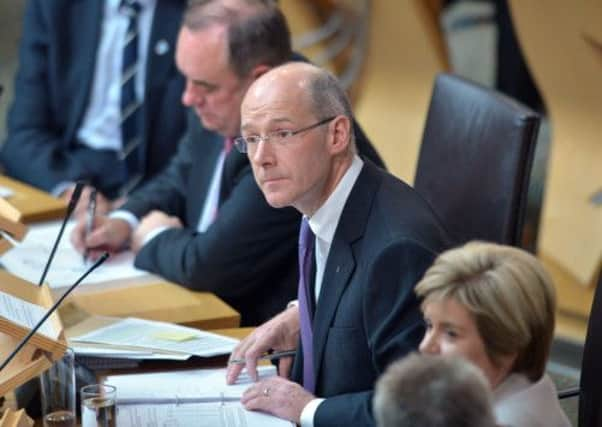Swinney told fiscal office must be non-partisan


John Swinney announced plans for the new fiscal office earlier this year after the Scottish Government clashed with Westminster’s Office for Budget responsibility (OBR), amid claims that Scotland’s future oil wealth was being downplayed.
But opposition parties have voiced concern that it is an attempt by the SNP to produce more favourable figures and are demanding guarantees the new body will be free from ministerial influence.
Advertisement
Hide AdAdvertisement
Hide AdThe watchdog would also have a pivotal role in examining Scotland’s tax base, with Holyrood set to take on sweeping new tax-raising powers in the coming years.
A string of international bodies, including the Organisation for Economic Co-operation and Development (OECD), have told MSPs that it must be free from interference. “Independence and non-partisanship – real and perceived – is critical to an independent fiscal institutions’ success,” the OECD states in a submission to Holyrood’s finance committee.
It adds: “A truly non-partisan body does not present its analysis from a political perspective. It always strives to demonstrate objectivity and professional excellence and serves all parties.”
The Netherlands’ Bureau for Economic Policy Analysis was founded after the Second World War and is the world’s oldest fiscal watchdog. It states: “A reputation of quality and independence is crucial for the success of a watchdog. Building such a reputation takes time.”
The Canadian Parliamentary Budget Office says the role of any such body should be enshrined in law to ensure adequate safeguards.
It says: “Our experience shows that independent analysis by a parliamentary budget office is not always welcome by the executive. Sometimes the results may contradict the messages provided by the executive. Without the statute, the new body would be subject to pressure.”
A Scottish Government spokeswoman said last night that Mr Swinney had indicated that an “independent” body will be set up in relation to the tax powers in the Scotland Bill.
“The work of the Fiscal Commission will inform the government’s proposals both in relation to the Scotland Act and with independence,” she added.
Advertisement
Hide AdAdvertisement
Hide AdMr Swinney told the finance committee in May that he wants the new body up and running by 2015, when Scotland takes on new responsibility for stamp duty, landfill tax and income tax.
At the time, Mr Swinney attacked an “utterly inexplicable” projection of a 36 per cent rise in landfill tax at a time when recycling is on the rise and landfill deposits are declining.
The Scottish Government produced its own oil and gas estimates earlier this year, after complaining that the OBR predictions were too low.
The OBR predicted oil tax revenue would drop from £6.7 billion last year to £4.1bn by 2017-18, but the Scottish Government figures were considerably higher, with estimates of up to £57bn in tax revenue between now and 2018.
Liberal Democrat leader Willie Rennie said last night: “Given the SNP government’s history of dodging access to information and centralisation we must be given cast iron guarantees that any Scottish OBR will not become a ministerial rubber-stamping body.”
Opec’s doubts
Scotland’s reliance on North Sea oil and gas after independence has been called into question after the head of the Organisation of Petroleum Exporting Countries (Opec) said most of its reserves were “depleted”.
Opec secretary general Abdalla Salem el-Badri said Scotland, in his view, would be best off remaining in the United Kingdom.
“Myself, I don’t see how England will stay without Scotland and Scotland stay without England. This is how we all grew up, with the UK, not with Scotland and England,” he said yesterday.
Advertisement
Hide AdAdvertisement
Hide AdMr Badri admitted the Scottish referendum had “nothing to do with Opec”, which represents the world’s 12 oil-producing countries and controls a third of the world supply. However, he said: “Most of their reservoir is depleted now.”
About 16 per cent of a separate Scotland’s tax revenues could come from the North Sea, although the SNP insists North Sea reserves would be a “bonus” and the country’s onshore economy is strong enough to survive a split from the UK. There are still an estimated 15-20 billion barrels of oil left.